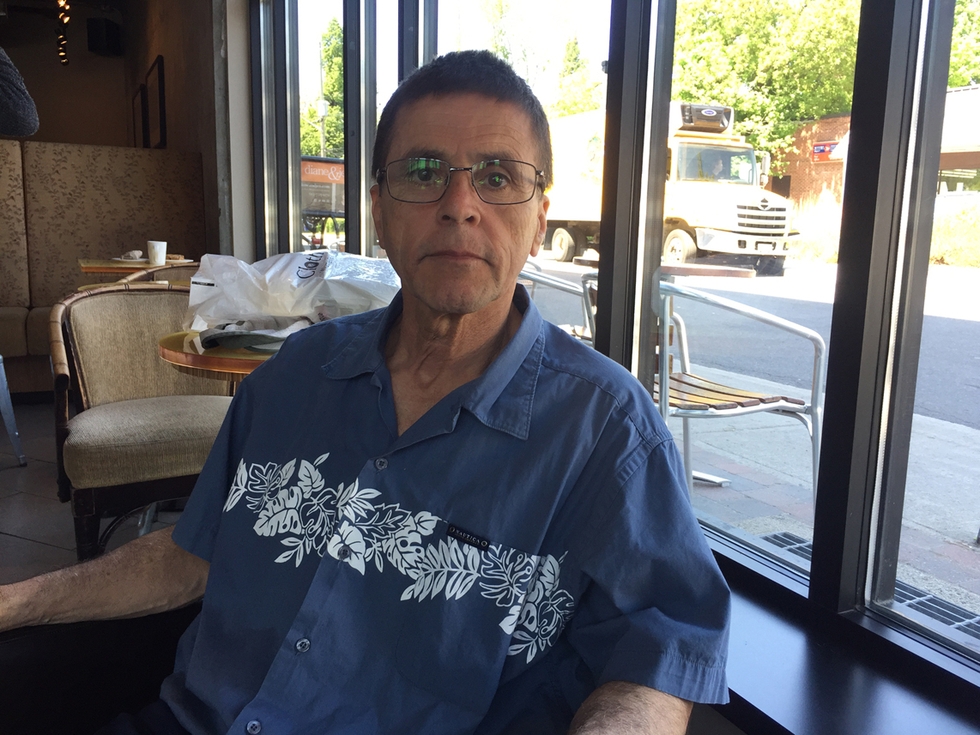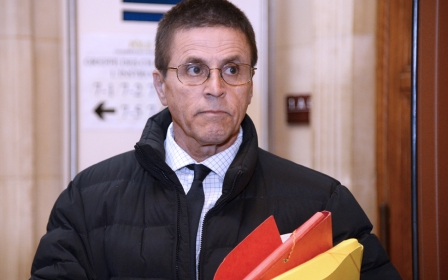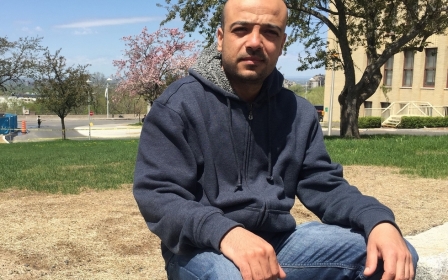Hassan Diab case calls into question Canada's extradition process

OTTAWA - Hassan Diab often has to remind himself that he can move around freely.
The former university professor who was accused of but never charged with a terrorism offence, spent three years in near-solitary confinement in a French prison, and almost six years under strict bail conditions in Canada.
For more than half a decade, he wore a tracking device around his ankle and he couldn’t go outside between 9pm and 7am or leave the Ottawa area. Every time he left his home, he had to be within view of a surety, who had put down money for his bail.
Today, he is free.
“It’s been more than 10 years, when things started. It’s been a very long ordeal,” he told Middle East Eye at a coffee shop in Ottawa only a few kilometres from Canada's parliament building.
It’s been more than 10 years, when things started. It’s been a very long ordeal
- Hassan Diab
Wearing a blue, flowered shirt that looks a little too big for his slight build – he lost a quarter of his body weight due to stress, he says – Diab speaks softly as he recounts his ordeal.
“Take 10 years of your life, take it and throw it away. Not just throw it away, I wasn’t in a coma and nothing happened- no. Ten years of struggle, 10 years of fear, 10 years of really living in uncertainty,” he says.
“What could be worse than living in uncertainty? Nothing.”
The case
But Diab’s fight isn’t over. New information recently surfaced about the involvement of a Canadian government official in his extradition to France, despite the unreliable - and secret - evidence used in the case against him.
A Canadian who also holds Lebanese citizenship, Diab was accused of being involved in a deadly bombing at a Paris synagogue in 1980, but he was never formally charged with a crime.
He was arrested in Canada at the behest of French authorities in 2008, and sent to France in 2014 after spending years fighting his extradition in Canadian courts.
The French authorities relied almost entirely on secret evidence and handwriting samples that they said matched Diab to the suspected bomber.
That evidence was highly questionable and refuted by handwriting experts called in by Diab’s defence team.
Diab has always denied being involved in the bombing, maintaining that he was in Lebanon when it happened.
An Ontario judge described the evidence against Diab as “weak, convoluted and confusing”, but his extradition went ahead anyway, prompting concerns about the low evidentiary standard required to grant an extradition request in Canada.
Diab spent three years in a maximum-security prison as his case stalled in France and French prosecutors vetoed several court decisions ordering his release. In January, they finally let Diab out of prison due to lack of evidence.
He returned to Ottawa soon thereafter, reuniting with his wife and two young children.
Diab is now calling on Canada to overhaul its Extradition Act and launch an independent inquiry into his ordeal.
“My first mission,” he told MEE, “is to get rid of this extradition law as we know it, because it’s not a law. I don’t consider it a law; it’s just a trap. Anybody can fall in it.”
Ottawa’s involvement
According to a report by CBC News, "the 'smoking gun' evidence that secured Diab's extradition to France in 2014 was obtained at the direction of a senior Canadian Department of Justice lawyer”.
The lawyer, Claude LeFrançois, worked in a specialised division within the department known as the International Assistance Group, CBC reported in early May.
LeFrançois alerted France that Diab’s defence team had presented evidence that put into question the claim that Diab’s handwriting matched that of the alleged Paris bomber, the report said.
He then encouraged French officials to find new evidence to tie Diab to the handwriting sample, and “he also obtained a series of court delays that gave France the time it needed to find the evidence”.
The lawyer also instructed France to send fingerprints of the bombing suspect to Canada, where federal police (RCMP) would test them against Diab’s.
When the fingerprints didn’t match; however, those results were never presented to the Canadian court deciding Diab’s extradition, the CBC report said.
Those results were also never presented to the defence team, said Diab’s longtime Canadian lawyer, Donald Bayne.
“You can be sure they wouldn’t have failed to put it before the judge, had it identified Dr Diab. So because it exonerated him and showed his innocence, they suppressed it,” Bayne told Middle East Eye in a telephone interview.
Simon Rivet, a spokesperson for the Ministry of Justice, said the IAG “reviews and coordinates all extradition and mutual legal assistance requests made either by or to Canada”.
You can be sure they wouldn’t have failed to put it before the judge, had it identified Dr. Diab. So because it exonerated him and showed his innocence, they suppressed it
- Donald Bayne, Diab's lawyer
Providing assistance to a country requesting extradition “with respect to the efficiency of their requests” falls under its mandate, Rivet told MEE in an email.
But Bayne said Canadian-sourced evidence – like the fingerprint test – is governed by local rules of evidence, which “require full disclosure of all evidence in possession of the Crown, helpful to or harmful to the Crown case”.
“The evidence was generated right in Ottawa, by the RCMP and the Department of Justice, and in the letter to the French, the Department of Justice lawyer conceded that this would be very powerful, if not conclusive, evidence that they intended to put before the judge,” Bayne said.
He said Diab’s case makes it clear that the Extradition Act is “unjust and needs substantial reform”.
Asked to comment on demands for the Extradition Act to be reformed, Rivet told Middle East Eye that the act isn’t formally under review.
"The minister is seeking guidance from her officials regarding the effectiveness of existing protections” in the act; however, “and has asked them to look at any lessons learned in relation to the Diab case", Rivet told MEE.
“That work is ongoing.”
Call for answers
In the meantime, prominent human rights and civil society groups have joined Diab’s call for an independent inquiry into his case.
That includes the British Columbia Civil Liberties Association, Amnesty International Canada and the Canadian Association of University Teachers, which condemned Ottawa for enabling "the suffering and jailing of one of its citizens in a foreign prison for 1,156 days without proper evidence".
Alex Neve, secretary general of Amnesty International Canada, said the report that the justice department played such a large role in Diab’s extradition raises “very serious concerns”.
It indicates that “the Canadian government certainly was not [a] neutral, uninterested bystander” in the extradition process, he told Middle East Eye, and instead played “an active role behind the scenes”.
Neve said this involvement came “even as it became clear that the evidence to back up the accusations against [Diab] was beyond weak and was crumbling quickly”.
“That paints a very different picture as to what Canada’s role was in this case, and certainly raises very serious concerns of even wrongdoing on the part of government lawyers,” he said.
Bayne said the government’s conduct must be examined in an independent, public inquiry conducted by a respected judge.
“The conduct of the department of justice is in question here and they can’t do the inquiry. It can’t be an internal inquiry. They can’t credibly inquire into their own conduct,” he said.
For his part, Diab said he wants the independent inquiry to help him understand why things happened the way they did – and who was involved.
“It’s not just about me; it’s about how they do things in this country,” said Diab, adding that he hopes to gain “something positive out of this whole negative experience”.
“I don’t believe things will be easy,” he said.
“It’s an uphill battle, but the only thing we can do is to keep trying. Because if we don’t try, I’m sure we’ll lose, but if we try, we may win. That’s the difference.”
Middle East Eye propose une couverture et une analyse indépendantes et incomparables du Moyen-Orient, de l’Afrique du Nord et d’autres régions du monde. Pour en savoir plus sur la reprise de ce contenu et les frais qui s’appliquent, veuillez remplir ce formulaire [en anglais]. Pour en savoir plus sur MEE, cliquez ici [en anglais].




